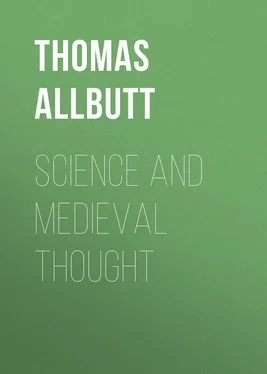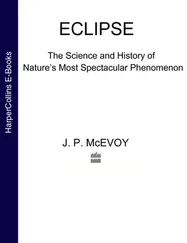Thomas Allbutt - Science and Medieval Thought
Здесь есть возможность читать онлайн «Thomas Allbutt - Science and Medieval Thought» — ознакомительный отрывок электронной книги совершенно бесплатно, а после прочтения отрывка купить полную версию. В некоторых случаях можно слушать аудио, скачать через торрент в формате fb2 и присутствует краткое содержание. Жанр: foreign_antique, foreign_prose, на английском языке. Описание произведения, (предисловие) а так же отзывы посетителей доступны на портале библиотеки ЛибКат.
- Название:Science and Medieval Thought
- Автор:
- Жанр:
- Год:неизвестен
- ISBN:нет данных
- Рейтинг книги:4 / 5. Голосов: 1
-
Избранное:Добавить в избранное
- Отзывы:
-
Ваша оценка:
- 80
- 1
- 2
- 3
- 4
- 5
Science and Medieval Thought: краткое содержание, описание и аннотация
Предлагаем к чтению аннотацию, описание, краткое содержание или предисловие (зависит от того, что написал сам автор книги «Science and Medieval Thought»). Если вы не нашли необходимую информацию о книге — напишите в комментариях, мы постараемся отыскать её.
Science and Medieval Thought — читать онлайн ознакомительный отрывок
Ниже представлен текст книги, разбитый по страницам. Система сохранения места последней прочитанной страницы, позволяет с удобством читать онлайн бесплатно книгу «Science and Medieval Thought», без необходимости каждый раз заново искать на чём Вы остановились. Поставьте закладку, и сможете в любой момент перейти на страницу, на которой закончили чтение.
Интервал:
Закладка:
In the growth of human societies small civilisations, however exquisite, have been sacrificed to the formation of vaster and vaster congregations of men; thus only, it would seem, is an equilibrium to be reached of sufficient stability for the highest ends of mankind. Greece, beautiful as was her bloom, penetrating as was her spirit, perhaps because of her very freedom of thought, never became a nation; her city states were too wilful to combine. The Macedonian power broadened the foundation of polity eastward and westward; and this work was carried as far perhaps as sword and fasces could carry it by the power of Rome. But even the Roman peace, bought as it was at the cost of learning and the arts, was but a mechanical peace; in the wilder, more turbulent and more heterogeneous peoples of the later Empire the bodies but not the wills of men were in subjugation. The great system of Roman Law, which Numa, the Moses of Rome, had invested with supernatural awe, had become but an external rule; even in Rome herself, poorer in people, poorer in commerce, poorer than ever in ideas, the sanction of patriotism was failing, and her citizens were held together for the most part by their baser and more dangerous passions 3 3 “Nec ullum satis validum imperium erat coercendis seditionibus populi, flagitia hominum ut cæremonias deum protegentis.” Tac. Ann. iii. 60.
. For Eastern Europe the University of Constantinople established a compact and uniform system of thought, subtle prolix and acquisitive rather than original or profound; but in the West, under the Frank and later Northern devastations, the very traditions of learning and obedience were broken up; schools were closed, and even the art of writing was almost lost. Then it was that the cohesion and development of Western Europe were saved by a new and a wonderful thing. From the East, the home of religions, had spread, like an exhalation, Christianity, that religion which proves by its survival that it is the fittest sanction for the will of man. This religion, entering as a new spirit into the ancient fabric of Roman Empire, was to hold men’s service in heart and soul as well as in body; yet to this end no mere mystic or personal religion could suffice: clothing itself with the political and ritual pride and even with the mythology of the pagan Empire it inspired a new adoration; but it imposed also upon Europe a catholic and elaborated creed. To preserve the authority of the common faith not only must every knee be bowed, not only must every heart be touched, but to build and to repair its fabric every mind must also bring its service. How the scheme of the Faith was built up, how oriental ecstasy and hellenistic subtlety, possessing themselves of the machinery of Roman pomp, were wrought to this end, we may briefly consider.
As, politically, under Diocletian and Constantine the ancient world gave place to the new, so in the third century philosophy was born again in neo-platonism 4 4 It must not be supposed that the idealism of Plato and the mysticism of the East were alike, or even akin. Plato was a Greek; his mind, as we appreciate such qualities, was sane and lucid: he had no yearning whatever for absorption in the Infinite; but rather, like Aristotle, for a noble life.
, the offspring of the coition of East and West in Alexandria, where all religions and all philosophies met together. The world and the flesh were crucified that by the spirit, man might enter into God 5 5 “Oftener on her knees than on her feet Died every day she lived.” Macbeth IV. 3.
. Pure in its ethical mood, neo-platonism, says Harnack, led surely to intellectual bankruptcy; the irruption of the barbarians was not altogether the cause of the eclipse of natural knowledge: to transcendental intuition the wisdom of the world had become foolishness. Yet even then, as again and again, came the genius of Aristotle to save the human mind. The death of Hypatia was the death of the School of Alexandria, but in Athens neo-platonism survived and grew. Proclus, ascetic as he was, was versed also in Aristotle; and he compelled the Eastern mysteries into categories: so that on the closure of the School of Athens by Justinian (a. d. 529) a formal philosophy was bequeathed to the Faith; the first scholastic period was fashioned, and the objects and methods of enquiry were determined for thirty generations. From Aristotle Europe adopted logic first, and then metaphysics, yet both in method and in purpose Origen and Augustine were platonists; rationalised dogma lived upon dialectic, and conflicted with mysticism; but logic, dogma and mysticism alike disdained experience.
Thus, no mere external sanction, stood the Faith; threefold: from the past it brought its pompous ritual, it appealed by its subtle dogmatic scheme to the intellects, and by its devotion to the hearts of men. Through the mirage of it, when its substance had waned, Copernicus, Galileo, and Harvey had to steer by the compass of the experimental method. This was their chief adversity, and of other adversities I have to speak.
The visitor to the Dominican Church of St Catherine at Pisa will see on its walls St Thomas of Aquino with the Holy Scriptures in his hand; prostrate beneath him is Averroes with his Great Commentary, but beside him Plato bearing the Timæus. It was the fortune of the Faith that, of all the treatises of Plato, the Timæus, the most fantastic and the least scientific, should have been set apart to instruct the medieval world; that the cosmical scheme of the Timæus, apparelled in the Latin of Chalcidius, – for there were then no Greek texts in the libraries of the West, – should for some 500 years have occupied that theoretical activity which Aristotle regarded as the highest good of man 6 6 I see in recent reports of Egyptian exploration that at Oxyrhynchus Plato was represented with curious persistence by the Phædo and the Laches; and these treatises appear in the early Fayyum papyri.
. Again, those works of. Aristotle which might have made for natural knowledge fell out of men’s hands 7 7 A few axioms, collected from the physical and metaphysical treatises (perhaps by Cassiodorus from Boetius), were current from an early date. The translations of Boetius must for a time have lain in some neglect?
, while in them, as Abélard tells us of himself, lay the Categories, the Interpretation, and the Introduction of Porphyry to the Categories, all in the Latin of Boetius 8 8 Alcuin had but a translated abridgment or summary of the Categories, attributed to Augustine; and in a MS. of the tenth century we find no more than this. Boetius’ full translation of the Categories was not current till the end of this century, when all the logic of Aristotle was in the hands of the doctors. In the earlier Middle Ages, as in the writings of John of Salisbury and of William of Conches, we hear even more of Boetius than of the master himself. Virgil, Seneca and Cicero also were the sources of much of the culture of this period. Alcuin was a grammarian; he taught from Priscian and Donatus, improved the eighth century Latin, and probably made Virgil and Cicero known in Gaul and Britain. He knew but little Greek, as we infer from his quotation of the names of the Categories. Erigena knew more Greek and carried some of it to the Court of Charles the Bald. See note 2, p. 65. Alcuin probably did not visit Ireland. Boetius had translated also both Analytics and the Topics.
; treatises which made for peripatetic nominalism, but whereby men were versed rather in logic and rhetoric than in natural science. Thus Plato’s chimera of the human microcosm, a reflection of his theory of the macrocosm, stood beside the Faith as the second great adversary of physiology.
The influence of authority, by which Europe was to be welded together, governed all human ideas. As in theology was the authority of the Faith, so in the science and medicine of the first period of the Middle Ages was that of the neo-platonic doctrines, and, in the second period, of the Arabian versions of Galen and of Aristotle; furthermore in this rigid discipline metallic doctrine almost necessarily overbore life and freedom. It is not easy for us to realise a time when intellectual progress – which involves the successive abandonment of provisional syntheses – was unconceived; when truths were regarded as stationary; when reasons were not tested but counted and balanced; when even the later Averroists found final answers either in Aristotle or in Galen 9 9 Yet Roger Bacon seems to have apprehended both progress and the relativity of truth. Before Newman, he declared that God makes no full revelation but gives it in instalments; and in another passage he speaks of the judgments of Aristotle, and of other great teachers, “secundum possibilitatem sui temporis … aliud tempus fuit tunc, et aliud nunc est” – a remarkable saying. Of the Saints he says “they had their time, we have our own.” Vid. also note, p. 80.
. Thus in the irony of things it came to pass that Harvey was withstood by the dogma of Galen who, in his own day, had passionately appealed from dogma to nature.
Интервал:
Закладка:
Похожие книги на «Science and Medieval Thought»
Представляем Вашему вниманию похожие книги на «Science and Medieval Thought» списком для выбора. Мы отобрали схожую по названию и смыслу литературу в надежде предоставить читателям больше вариантов отыскать новые, интересные, ещё непрочитанные произведения.
Обсуждение, отзывы о книге «Science and Medieval Thought» и просто собственные мнения читателей. Оставьте ваши комментарии, напишите, что Вы думаете о произведении, его смысле или главных героях. Укажите что конкретно понравилось, а что нет, и почему Вы так считаете.












